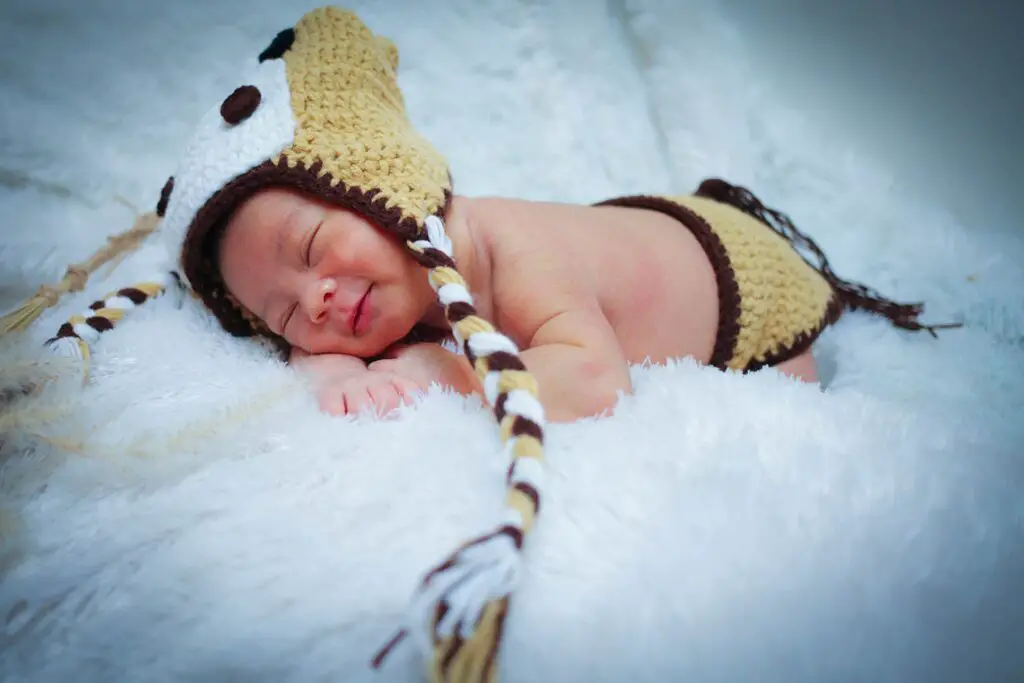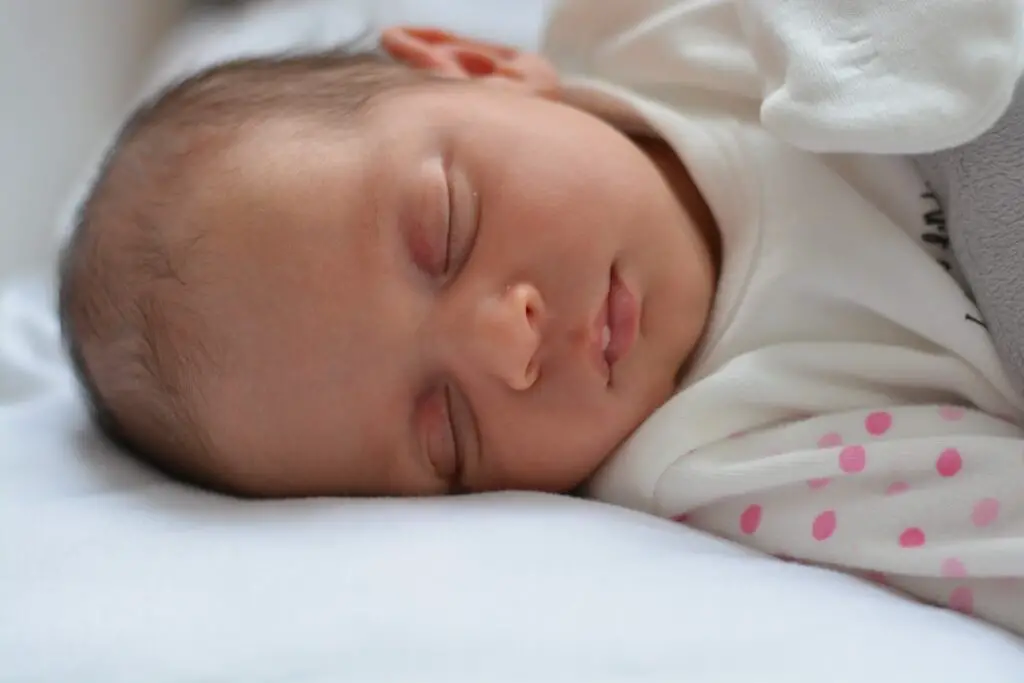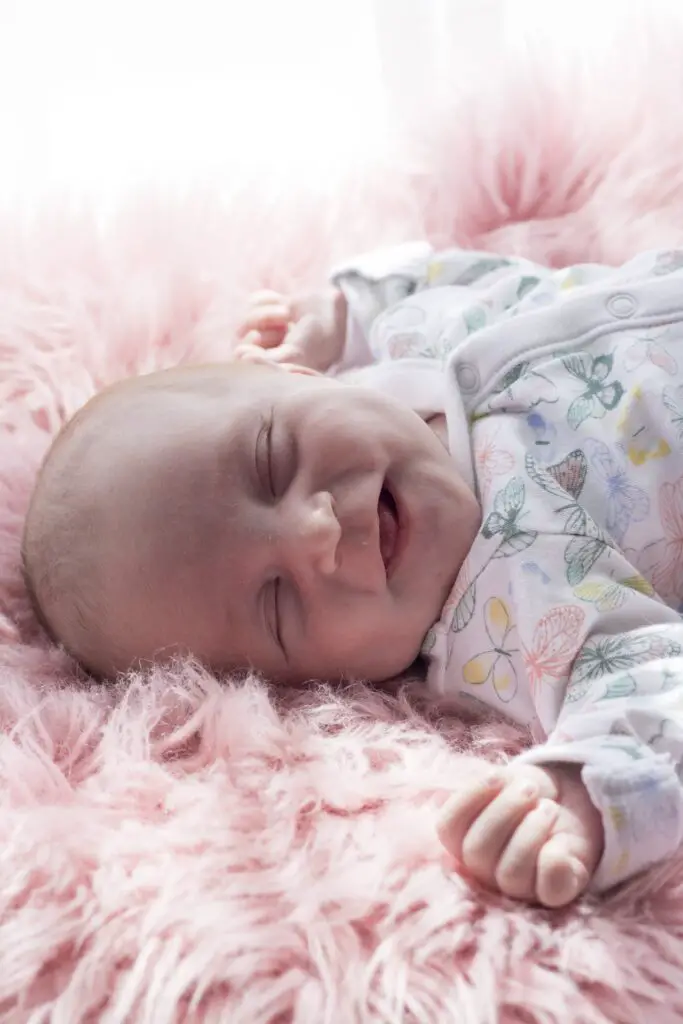Have you ever wondered why do babies smile in their sleep?
These fascinating moments capture our hearts and make us ponder what’s going on in their little minds. Babies spend an impressive amount of their lives sleeping, which can explain why we often see these endearing smiles while they’re in dreamland.
Sleep is an essential part of a baby’s growth and development, and as they journey through different sleep stages, they exhibit a variety of behaviors. As their brains develop, babies may begin to smile during sleep in response to dreams, involuntary reflexes, or even simple physical reactions such as gas.
Understanding why babies smile in their sleep can give us insight into their neurological maturation and emotional development.
Key Takeaways
- Babies’ sleep serves as a crucial period for growth and development.
- Smiling in sleep may be attributed to dreams, reflexes or physical reactions.
- Such smiles can provide insights into babies’ neurological and emotional progress.
Why Do Babies Smile In Their Sleep
As a parent, I find it fascinating to observe the sleep patterns of my baby. The smiles that sometimes appear on their face while they’re sleeping make the experience even more endearing.
In order to better understand why babies smile in their sleep, it’s essential to get familiar with the various stages of sleep and how they influence a baby’s sleep journey.
Stages of Sleep
Just like adults, babies go through different stages of sleep. These stages can be broadly categorized into quiet sleep, active sleep, and REM sleep. Each stage has its unique characteristics, and babies often cycle through them multiple times during a single nap or nighttime sleep.
Sleep Cycles
A baby’s sleep cycle typically lasts for 50-60 minutes. It starts with a period of quiet sleep, during which the baby’s breathing and heart rate are regular, and their body is rather still.
Then comes active sleep, characterized by movement, breathing variations, and sometimes smiling.
Finally, the baby transitions into REM sleep before restarting the cycle.
REM Sleep
REM sleep is the phase during which babies are believed to experience dreams. This stage is characterized by rapid eye movement and irregular breathing. It is during REM sleep that babies often smile, laugh, or exhibit other facial expressions.
Although it’s difficult to confirm whether babies dream, many researchers suggest that smiling during REM sleep could be a reflex rather than a response to a dream.
Quiet Sleep
During quiet sleep, a baby’s body is mostly still, and their breathing is even and regular. This stage is essential for their physical growth and development. It provides the baby with much-needed rest and allows their brain to process new information.
Active Sleep
In active sleep, a baby’s breathing becomes more irregular, and they may move around or make small noises. This stage is believed to be crucial for brain development, particularly in areas related to learning and memory.
Smiles might also appear during active sleep, making it an essential part of a baby’s sleep journey.
Comprehending the stages of sleep can help us better comprehend why babies smile in their sleep. From REM sleep to active sleep, each stage plays a role in a baby’s overall development, and their smiling faces during sleep provide a glimpse into their fascinating sleep journey.
Exploring Reasons for Smiling in Sleep

Dreaming
As a parent, I often find myself watching my baby sleeping and wondering if they’re having sweet dreams. Some researchers believe that babies might be experiencing positive dream imagery, and that’s why they smile during their sleep.
It’s a fascinating possibility that adorable baby smiles at night might be due to the wondrous world of infant dreaming!
Physical Growth
Another reason for babies smiling in their sleep could be related to their physical growth. Smiling can help develop the muscles used for smiling and laughter, laying the groundwork for those expressions as the child grows.
Smiling during sleep might signal the baby’s brain and muscles working together in harmony to prepare for future smiles and laughter.
Passing Gas
We all know that babies can be quite gassy, and sometimes they might smile in their sleep due to passing gas. It’s incredible how our little ones can still look so adorable, even when dealing with something as common as gas!
Although it might not be as heartwarming as dreaming, it’s still an essential part of their development and can bring a smile, both to them and us.
Involuntary Reflex
Lastly, babies might also smile in their sleep because of an involuntary reflex. Newborns up to a few months old often exhibit reflexive smiles, which are not connected to emotions or social situations.
It’s all just part of their neurological maturation process, and it’s interesting to observe that even an involuntary smile can add so much charm to our sleeping babies.
I find it truly heartening to know that there are so many potential reasons for my baby’s sleep smiles. Whether it’s dreaming, physical growth, passing gas, or an involuntary reflex, these precious smiles never cease to delight me and remind me of the wonders of life and parenthood.
Types of Baby Smiles
Reflexive Smile
As a parent, I have often noticed that babies smile for different reasons. One of the most common types of smile is the reflexive smile. These reflexive smiles are an involuntary reaction that occurs as a result of a baby’s developing nervous system.
I have observed that these smiles can occur during sleep or when my baby is awake. Contrary to what some may think, these reflexive smiles are not triggered by a baby’s emotions or sensory experiences but are instead a natural part of their development.
Social Smile
Another type of smile that I have frequently seen in my baby is the social smile. These smiles tend to be more responsive and are a result of my baby reacting to social cues and interactions.
In contrast to reflex smiles, social smiles show that my baby is starting to recognize familiar faces and voices. As my baby grows older, their social smile will become more intentional and distinct, signaling their ability to understand and respond to social situations.
Spontaneous Smile
Finally, one of the most endearing and intriguing types of baby smiles is the spontaneous smile. These smiles seem to appear out of nowhere, often leaving me wondering what my baby might be thinking or feeling.
Spontaneous smiles may be a result of my baby’s improving memory, allowing them to replay happy moments or sensory experiences. Although I can’t be certain of the specific cause of my baby’s spontaneous smiles, it’s always a heartwarming sight to behold.
Throughout my baby’s development, I have had the delight of witnessing a variety of smiles, each with its own unique expression and purpose.
From reflexive smiles that showcase my baby’s natural development to social smiles that reflect their growing understanding of the world around them, these smiles bring joy and wonder to my parenting journey.
Understanding Emotional Development in Babies

Emotional Expression
When I observe babies, it’s always fascinating to witness the various emotional expressions they exhibit. So many factors contribute to the emotional development in babies, and it’s crucial to understand these factors to better grasp their emotional world.
Smiling, for instance, has been linked to neurological maturation in infants. As their brains develop, so do their involuntary reflexes and responses during sleep.
Developing Emotions
As babies grow older, their emotional expressions become more complex. Early on, emotions like happiness and distress are the most prominent. During the first two months, infants primarily exhibit reflexive smiles. These smiles are involuntary and are not necessarily a response to external stimuli.
Then, around two or three months, babies begin to display genuine smiles as a result of emotional development. These genuine smiles often occur during sleep, and they reflect the emergence of more complex emotions.
Positive Emotions
I strongly believe that emotional development in babies is a complex process that involves a mix of nature and nurture. Positive emotions, such as happiness, play a fundamental role in shaping a baby’s emotional well-being.
Smiling, especially during sleep, can signify a baby’s contentment, which is essential for their overall development.
Moreover, the Sleep Foundation suggests that spontaneous smiles during sleep could help in developing the muscles used for smiling and laughter as a child grows, further promoting positive emotions in their lives.
Concerns and Consultations
Gelastic Seizures
As a parent, I’ve learned that there are some medical conditions to be aware of when noticing my baby smiling in their sleep. One such condition is gelastic seizures, which are extremely rare and cause uncontrollable laughter without amusement.
If I were to notice consistent, unusual laughter, I’d definitely consult with a pediatrician.
Twitching
I’ve also observed my baby occasionally twitching in their sleep. This can be quite common, especially during the REM stage of sleep.
Nevertheless, it’s important to monitor the frequency of twitching; if it occurs frequently or disrupts the baby’s sleep, it’s worth discussing it with a pediatrician to ensure there are no underlying issues.
Epilepsy
As a concerned parent, I know that epilepsy is another condition to be aware of in relation to babies smiling in their sleep. While rare, infantile epilepsy can cause certain facial expressions like smiling or grimacing.
If I were to notice any unusual behavior along with the smiling, I’d consult with a pediatrician for further evaluation.
Cause for Concern
Although seeing my baby smile in their sleep is heartwarming, sometimes the underlying causes could be a reason for concern. It is essential to observe any associated behaviors or signs that might indicate a problem, such as prolonged twitching or unusual laughter.
In these cases, seeking a pediatrician’s advice is the best course of action to ensure my baby’s well-being.
Analysis of Baby Brain Development

Neural Pathways
As babies grow and develop, their brains are constantly forming new connections known as neural pathways. These pathways are essential for their cognitive, emotional, and physical development.
I’ve learned that smiling in their sleep may play a role in the development of these neural pathways. This is especially important for the growth of skills like emotional processing and responding to various stimuli.
Cerebral Cortex
The cerebral cortex is the outer layer of the brain, responsible for higher-order functions like thinking, perception, and decision-making. I found out that during the REM sleep cycle, babies have a lot of brain activity in this region, which may give rise to spontaneous smiles.
These smiles can help in the development of facial muscles used for smiling and laughter as the child grows.
Sensory Experiences
In their early stages of development, babies predominantly rely on sensory experiences to understand the world around them. While they’re asleep, the brain continues to process these experiences, laying the groundwork for their later social interactions.
Smiling in their sleep may be a way for babies to practice responding to different sensations and stimuli, ultimately strengthening their sensory processing abilities.
In summary, smiling in their sleep plays a crucial role in a baby’s brain development. It helps to establish neural pathways, stimulate activity in the cerebral cortex, and improve sensory experiences.
As a result, these natural and involuntary smiles that occur during sleep play a significant part in a baby’s overall growth and development. It’s truly fascinating to witness the intricacies of early infant brain development and the role that sleep and smiling play in it.
Closing Thoughts
As I continue to ponder why babies smile in their sleep, I can’t help but feel a sense of warmth and joy. Many reasons contribute to these precious moments, including involuntary reflexes, gas, or even social stimulation.
While we may never know the exact cause behind each smile, it’s fascinating to think about the potential development that’s taking place within their little minds and bodies.
Not only do their tiny smiles brighten our day, but they also serve a practical purpose, such as preparing the muscles for future smiling and laughter. I find it remarkable how even the simplest of reflexes could play a crucial role in their growth and social development.
As I wrap up my thoughts, I’d also like to touch on another aspect of babies’ development – sucking. Sucking is an essential reflex for newborns, as it enables them to feed properly.
From honing their muscle control to providing comfort, the simple act of sucking is vital for their well-being.
In the end, witnessing babies smile in their sleep is one of the many joys that come with parenthood. These little expressions can serve as gentle reminders of the wonder and mystery that surrounds our children’s development.
With each smile, I am filled with a sense of awe, appreciation, and amazement for the tiny human being in front of me.
Frequently Asked Questions
What causes infants to smile during sleep?
As a parent, I have often wondered why my baby smiles during sleep. From what I’ve learned, most experts believe that these smiles are spontaneous rather than social smiles. It could also be caused by involuntary reflexes or gas.
Is smiling in sleep related to a baby’s happiness?
While it’s tempting to think that a baby’s sleep-smile is a sign of happiness, this might not always be the case. Some experts believe that these smiles are more likely to be a reflex rather than a response to a positive dream.
Can infant smiling be linked to dreaming?
It’s challenging to determine whether or not babies dream, as they can’t verbalize their experiences. However, when babies smile or laugh in their sleep, it’s often believed to be a reflex rather than a response to a dream they’re having.
Do babies smile in sleep because of digestion?
One of the reasons babies might smile in their sleep could be related to gas. As their digestive systems develop, babies might experience some discomfort or gas, which can cause them to smile or grimace during sleep.
How does age affect sleep-smiling in babies?
As babies grow, it’s normal for them to hold people’s gazes and produce social smiles without looking directly at someone. This behavior should develop and strengthen over time.
As they grow older, unique factors might cause them to smile in their sleep, but it’s essential to remember that each baby is different.
What’s the significance of sleep-smiling in different cultures?
A baby’s smile in sleep might be considered charming or heartwarming across various cultures. However, specific cultural interpretations or beliefs might exist that are unique to each community.
Understanding these cultural perspectives can provide insight into human experiences and add depth to our knowledge of infant sleep behaviors.














